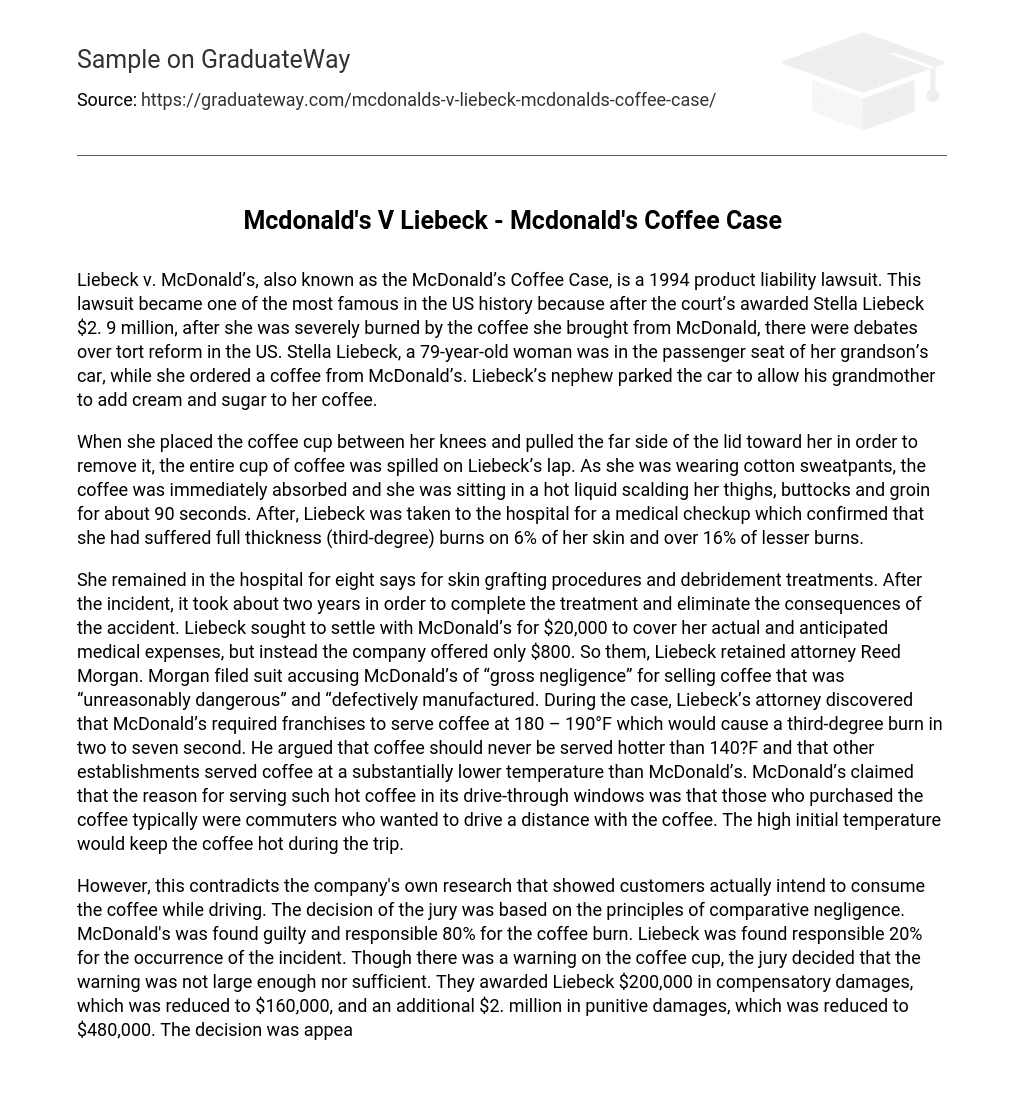The McDonald’s Coffee Case, also known as Liebeck v. McDonald’s, is a famous lawsuit regarding product liability that took place in 1994. This particular case drew significant attention in American history due to its outcome. Stella Liebeck, the plaintiff in this case, received $2.9 million from the court after suffering severe burns caused by a cup of coffee she bought at McDonald’s. The aftermath of this lawsuit sparked discussions on tort reform within the United States.
During the incident, Stella Liebeck, who was 79 years old at the time, was sitting in her grandson’s car when she ordered coffee from McDonald’s. Her nephew stopped the car so she could add cream and sugar to her coffee.
While attempting to remove the lid, Liebeck accidentally spilled the entire cup of coffee on herself. The hot liquid quickly soaked into her cotton sweatpants, causing severe burns on her thighs, buttocks, and groin for approximately 90 seconds. She was then taken to the hospital where a medical examination confirmed third-degree burns covering 6% of her skin and lesser burns on over 16%.
After spending eight days in the hospital for skin grafting procedures and debridement treatments, it took approximately two years to fully recover from the accident. Initially, Liebeck proposed a settlement of $20,000 to cover medical expenses, but McDonald’s only offered $800. Consequently, Liebeck enlisted lawyer Reed Morgan and filed a lawsuit against McDonald’s, accusing them of “gross negligence” for selling dangerously hot and defective coffee. It was revealed during the trial that McDonald’s required its franchises to serve coffee at a temperature that could cause severe burns within a few seconds. Liebeck’s attorney argued that coffee should never exceed 140°F, and other establishments served it at much lower temperatures than McDonald’s. McDonald’s defended its practice, claiming that the high temperature was necessary for customers who bought coffee at the drive-through and intended to travel long distances, ensuring the coffee remained hot during the journey.
The company’s research revealed that customers actually intend to consume the coffee while driving, which contradicted previous beliefs. The jury concluded that McDonald’s bore 80% responsibility for the coffee burn incident, while Liebeck was found 20% responsible. Despite a warning on the coffee cup, the jury deemed it insufficient. Consequently, Liebeck was awarded $200,000 in compensatory damages (later reduced to $160,000) and $2 million in punitive damages (later reduced to $480,000). Both McDonald’s and Liebeck appealed but ultimately settled out of court for an undisclosed amount under $600,000. This legal case had significant implications in both business and legal realms. McDonald’s had to reevaluate its policies as it knowingly served hot coffee without taking precautions to minimize or prevent potential injuries due to cost-saving measures and cheaper coffee.
McDonald’s has revised their policy to serve coffee at a temperature that effectively prevents immediate third-degree burns, resulting in discussions about tort reform in the United States. This incident emphasizes a product liability lawsuit and highlights the importance of prioritizing consumer safety. It is crucial to place restrictions on excessive jury awards despite the lack of merit in this specific case.
Works Cited:
Here are the URLs to the articles: http://www.lectlaw.com/files/cur78.htm and http://www.associatedcontent.com/article/2545263/liebeck_v_mcdonalds_restaurants_or.html.





